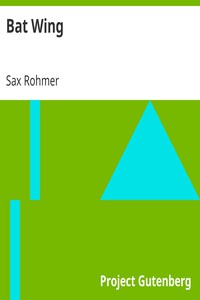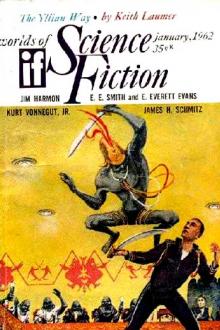Bat Wing by Sax Rohmer (bts books to read .TXT) 📗

- Author: Sax Rohmer
Book online «Bat Wing by Sax Rohmer (bts books to read .TXT) 📗». Author Sax Rohmer
“To escape?” I cried.
“Precisely. We are going to anticipate the probable movements of our blundering Aylesbury. In short, I wish you to present me to Mr. Colin Camber.”
“What?” I exclaimed, staring at him incredulously.
“I am going to ask you,” he began, and then, breaking off: “Quick, Knox, run!” he said.
And thereupon, to my amazement, he set off through the rhododendron bushes in the direction of the tower!
Utterly unable to grasp the meaning of his behaviour, I followed, nevertheless, and as we rounded the corner of the tower Harley pulled up short, and:
“I am not mad,” he explained rather breathlessly, “but I wanted to avoid being seen by that constable who is prowling about at the bottom of the lawn making signals in the direction of the library. Presumably he is replying to Inspector Aylesbury who wants to talk to us. I am determined to interview Camber before submitting to further official interrogation. It must be a cross-country journey, Knox. I am afraid we shall be a very muddy pair, but great issues may hang upon the success of our expedition.”
He set off briskly toward a belt of shrubbery which marked the edge of the little stream. Appreciating something of his intentions, I followed his lead unquestioningly; and, scrambling through the bushes:
“This was the point at which I descended last night,” he said. “You will have to wade, Knox, but the water is hardly above one’s ankles.”
He dropped into the brook, waded across, and began to climb up the opposite bank. I imitated his movements, and presently, having scrambled up on the farther side, we found ourselves standing on a narrow bank immediately under that summer house which Colin Camber had told me he had formerly used as a study.
“We can scarcely present ourselves at the kitchen door,” murmured Harley; “therefore we must try to find a way round to the front. There is barbed wire here. Be careful.”
I had now entered with zest into the business, and so the pair of us waded through rank grass which in places was waist high, and on through a perfect wilderness of weeds in which nettles dominated. Presently we came to a dry ditch, which we negotiated successfully, to find ourselves upon the high road some hundred yards to the west of the Guest House.
“I predict an unfriendly reception,” I said, panting from my exertions, and surveying my friend, who was a mockery of his ordinarily spruce self.
“We must face it,” he replied, grimly. “He has everything to gain by being civil to us.”
We proceeded along the dusty high road, almost overarched by trees.
“Harley,” I said, “this is going to be a highly unpleasant ordeal for me.”
Harley stopped short, staring at me sternly.
“I know, Knox,” he replied; “but I suppose you realize that a man’s life is at stake.”
“You mean—?”
“I mean that when we are both compelled to tell all we know, I doubt if there is a counsel in the land who would undertake the defence of Mr. Colin Camber.”
“Good God! then you think he is guilty?”
“Did I say so?” asked Harley, continuing on his way. “I don’t recollect saying so, Knox; but I do say that it will be a giant’s task to prove him innocent.”
“Then you believe him to be innocent?” I cried, eagerly.
“My dear fellow,” he replied, somewhat irritably, “I have not yet met Mr. Colin Camber. I will answer your question at the conclusion of the interview.”
CHAPTER XXI. THE WING OF A BAT
For a long time our knocking and ringing elicited no response. The brilliant state of the door-brass afforded evidence of the fact that Ah Tsong had arisen, even if the other members of the household were still sleeping, and Harley, growing irritable, executed a loud tattoo upon the knocker. This had its effect. The door opened and Ah Tsong looked out.
“Tell your master that Mr. Paul Harley has called to see him upon urgent business.”
“Master no got,” replied Ah Tsong, and proceeded to close the door.
Paul Harley thrust his hand against it and addressed the man rapidly in Chinese. I could not have supposed the face of Ah Tsong capable of expressing so much animation. At the sound of his native tongue his eyes lighted up, and:
“Tchée, tchée,” he said, turned, and disappeared.
Although he had studiously avoided looking at me, that Ah Tsong would inform his master of the identity of his second visitor I did not doubt. If I had doubted I should promptly have been disillusioned, for:
“Tell them to go away!” came a muffled cry from somewhere within. “No spy of Devil Menendez shall ever pass my doors again!”
The Chinaman, on retiring, had left the door wide open, and I could see right to the end of the gloomy hall. Ah Tsong presently re-appeared, shuffling along in our direction. Unemotionally:
“Master no got,” he repeated.
Paul Harley stamped his foot irritably.
“Good God, Knox,” he said, “this unreasonable fool almost exhausts my patience.”
Again he addressed Ah Tsong in Chinese, and although the man’s wrinkled ivory face exhibited no trace of emotion, a deep understanding was to be read in those oblique eyes; and a second time Ah Tsong turned and trotted back to the study. I could hear a muttered colloquy in progress, and suddenly the gaunt figure of Colin Camber burst into view.
He was shaved this morning, but arrayed as I had last seen him. Whilst he was not in that state of incoherent anger which I remembered and still resented, he was nevertheless in an evil temper.
He strode along the hallway, his large eyes widely opened, and fixing a cold stare upon the face of Harley.
“I learn that your name is Mr. Paul Harley,” he said, entirely ignoring my presence, “and you send me a very strange message. I am used to the ways of Señor Menendez, therefore your message does not deceive me. The gateway, sir, is directly behind you.”
Harley clenched his teeth, then:
“The scaffold, Mr. Camber,” he replied, “is directly in front of you.”
“What do you mean, sir?” demanded the other, and despite my resentment of the treatment which I had received at his hands, I could only admire the lofty disdain of his manner.





Comments (0)